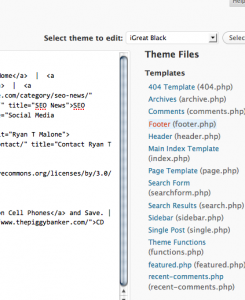
Over the time that I have been using WordPress and been practicing SEO and social media marketing, there are a few very solid tips that I can offer you on the basics of how to optimize your WordPress web site so that the search engines will fall head over heels for your web site!
Use Text For Your Site Title
Most WordPress themes will allow you to use text for your website title rather than using an image. The bonus of this is that if your website has a very keyword rich domain name and title, you dont want to waste an opportunity to put that awesome title in some H1 tags. As WordPress uses H1 tags in most themes by default for the main site title, this is possibly the easiest on page SEO that you will ever do with WordPress.
Sure, the plain text look can look quite boring, however with WordPress allowing easy customization of CSS in most themes, you can easily style your title. If this is too limiting, there is also the option to learn how hooks work in WordPress (its actually really quite easy, and I cant understand a word of PHP mind you…), which will allow you to completely style the entire header on your own, and create a style that is truly unique to your site, whilst keeping true to using a text title.
Change Your Permalink Structure!
I honestly can not believe how many people do not change their permalink structure. In older versions of WordPress, this used to be a hard task at times, with editing of the htaccess file needed in most cases, however with the latest version of WordPress, this is simply done with the touch of a button. In most cases, you will want your permalink to be category/post title based, however there are many more other options that are available, and can be discovered in the WordPress codex.
The structure that I recommend to all people as being the most effective permalink structure that I have used is /%category%/%postname%/. Not only are the keywords in your title going to be emphasized in your URL, but you also have a chance of ranking for your category keyword as well based on its appearance in the URL.
Utilize Your Footer!
Permitting that the theme that you are using allows for editing of your footer within its usage clause, adding links in your footer to categories can be highly beneficial. A lot of WordPress blogs use Java navigation for the top navigation, which as most of us know is not good for SEO as the search engine spiders have a great deal of difficulty reading links in Java. Keeping in mind that some tail keywords are too long to add to your navigation as well, whilst remaining tidy and user friendly.
The trick here is to create a list of category (keyword) links to their relevant archive pages in your footer. Make sure to emphasize these in bold as well. What this will in turn do, is it will allow the search engine spiders and crawlers to further visit more pages on your WordPress website, and will index them accordingly. If you use pages instead of posts, then these can be used for your level one pages, just be sure to link these pages internally to their child pages.
There are plenty more ways to optimize WordPress for SEO, such as the world famous All In One SEO plugin that I am starting to believe that WordPress should integrate as a new feature, however the above three methods are fairly simple and easy methods that will simply allow the search engine robots and crawlers to better index your website much easier, without having to rely on other extreme off page measures.


